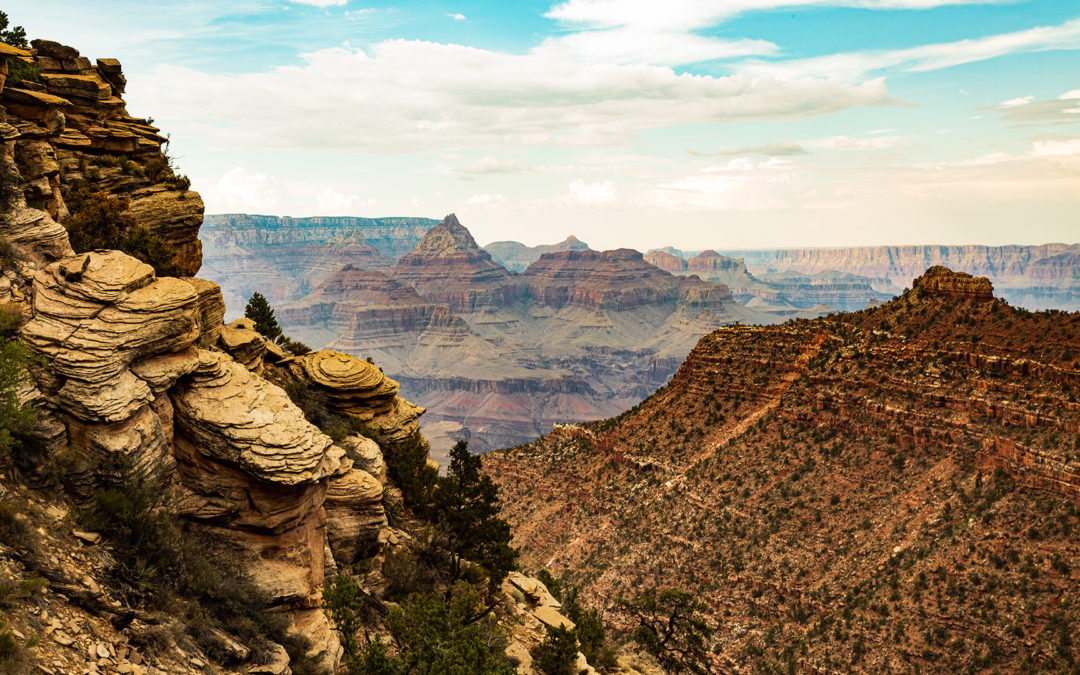Photo by Christy Lorio
I could have stayed my ass at home, but I didn’t. It was a chemo week and I had already purchased a back country permit months ago and planned out this Grand Canyon overnight camping trip at Horseshoe Mesa, about three miles down the Grandview Trail. I reserved a campsite for three: Myself, Thomas, my husband, and our dear friend Fernando.
Grandview is one the hardest trails on the South Rim, mainly because it’s incredibly steep and unmaintained. Unlike the relatively smooth popular trails, Grandview has you side stepping boulders, shuffling down cobblestone, and tip toeing on a ridge just wide enough to place your two feet together without falling off an extreme drop-off as you descend 2,500 feet in elevation.
I had anxiety about hiking Grandview weeks before the hike. I hiked it twice before as a day hike eighteen years ago, when I worked at the Canyon for a summer and youth was on my side. Breaking up the hike by camping one night on the mesa would be easier, but hiking with stage IV rectal cancer brings up so many doubts, so many physical concerns. Xeloda, the chemo pills I’m on, makes my hands and feet peel and hurt and gives me delightful bouts of diarrhea. I was terrified that I would spend most of the trip on a back country compost toilet, nothing but blue skies while I shit my brains out and my feet throbbed. Lung radiation I had the year before left me with shortness of breath and a cough. I worried that I wouldn’t physically be able to do it, playing out scenarios in my head of me getting dizzy and falling off the trail to my demise.
On the hike down, I tapped into my muscle memory, a reminder that yes, despite what my body has been through the past three years, I can still do the damn thing. I navigated the cobblestone rocks the same way I navigated cancer treatment— cautious but trusting myself. My movements were slow and deliberate, carefully placing my feet to prevent slipping and leaning into my trekking poles for balance. No sudden moves, just deliberate actions. The terrain on Grandview is so rocky that it took 2.5 hours to hike three miles. We never gained purchase on the trail, our toes banged into the fronts of our boots as gravity reminded us to heed caution.
The first time I hiked to the bottom of the Canyon I did it for my dad, who died of colon cancer the year before. The last thing he wanted to do was hike to the bottom. He didn’t get the chance, so I do it for him a year later. And then I did it over and over again— ten times to the bottom and countless other hikes, including Grandview to Horseshoe Mesa.
We camped that night on the Mesa, watching the sunset as we pitched our tents. We were the only people in such that vast landscape, like ants crawling on a rock. Planes flew overhead; I wondered if the passengers considered the people below them. When the stars came out, I imagined my dad floating next to the Milky Way, beaming with love and strength.
The next morning, I downed my chemo pills with electrolyte infused water after heating up a dehydrated meal on the camp stove. We started to hike out two hours later than expected— we opted for extra sleep after a slight drizzle sent us grabbing our rain tarp at two a.m. Aside from the threat of rain, the night had been pleasant.
The mesa was already sunbaked at 8:40 a.m. My calves felt wobbly and my head felt drained. Things were not looking good. I imagined roasting in the Canyon until I could hike out later that evening, or being rescued by a crew of park rangers. I wasn’t used to my body failing me on the trail. I soldiered on, trying to keep up with Fernando and Thomas at an attempt to diminish my weakness. My backpack weighed just 15 pounds. I’ve carried twice that amount on previous hikes, but cancer treatment was wearing me down. Thomas offered to carry my burden, which I initially refused, not wanting to weigh him down even more. He’s been my caregiver for the past three years and has done so much for me already but he insisted, so I broke down and let him carry my pack.
I immediately felt lighter, better, and stronger without the pack. I kept up with Thomas and Fernando, pushing my poles into the earth to propel me forward. The hike was, as Fernando described it, “masochistic,” but once I snapped out of my funk it wasn’t as bad as I imagined. My lungs weren’t overworked, my heart rate was steady. I knew how do this, I’ve done it before.
Inch by inch, mile by mile, we were making our way out of the Canyon, traversing Grandview in reverse. The cobblestone steps were slippery on the descent; on the way up they were brutally steep. We trudged along, stopping for snack and water breaks. Thomas and Fernando traded carrying my pack. Eventually, I was able to recenter myself and carried my pack for the last leg of the hike. We rejoiced when we hit the trailhead. Day tourists congratulated us for the trek we just made.
“Fuck cancer,” I said as we shuffled back to the car.
Christy Lorio is a New Orleans based writer and photographer with a penchant for Northern Arizona, particularly the Grand Canyon. Her essays have appeared in Nurture Literary, Had, Entropy, 433 Mag, Barren Magazine, Cancer Wellness and Oxford American, among others. Christy holds an MFA in Creative Writing from The University of New Orleans, where she is currently pursuing a second MFA in Studio Art. She is currently exploring the ways in which her writing and photography intersect.

